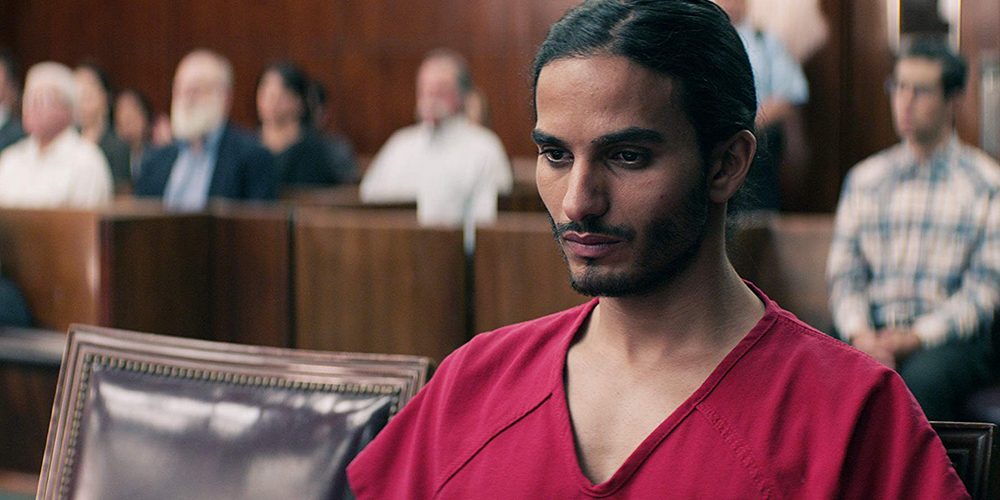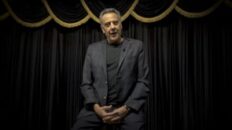As a reminder, my recaps are a little stream of consciousness, as I’m writing while I watch. Sometimes I might posit a theory that’s confirmed or disproven a few sentences later. Sometimes I’m guessing at what’s going on. I also take a “you’re sitting next to me on my couch while I watch” approach. That means you also get all my snarky comments as I watch. It’s part and parcel of watching TV with me.
Episode 4 begins with a look at someone’s MRI scans. It looks like they have several inoperable brain tumors which are likely to cause severe psychiatric and behavioral disorders. I feel like we’re supposed to assume this is the guy who claims he’s talking directly to God, but honestly my first assumption was that this had to be Geller, who is the oddest, least normal acting person in the show so far. We jump to Geller at the hospital following what is now confirmed to be a miscarriage. The drugs she has been taking are to help her get and stay pregnant, but this is her fourth miscarriage. The doctor calls her Mrs. Geller, which she doesn’t reject. So…is her husband dead and she’s trying to get pregnant from frozen sperm? Cause it’s a little weird if he’s still around and we’ve never heard him mentioned or even seen a phone call in all this time. And we learn two seconds later that’s exactly the case (I’m basically liveblogging this, so you’re getting my thoughts in real time). He is dead, from cancer (maybe that was the MRI at the beginning?), and she’s trying to conceive from frozen sperm.
Back in Townless, Texas (sorry, but the town is gone, it’s just a barren scrap of land now), Rebecca says nothing, but seems to be considering the suffering around her as people grapple with the loss of everything they had. It’s interesting because previously she’d voiced a feeling that in her dream, she was relieved the town was destroyed, and clearly, she hated living there. But does she still feel that way? Felix is approached by a hippie who tells him people are coming there to set up camp and be near where the miracle happened. I’d say this is a weirdly American phenomenon, but 2,000 people followed this dude out into the desert, so, it’s another one of those “people are more alike than you realize” type things that the show likes to point out.
In the meantime, Al-Masih (through Felix’s help) has obtained a hard-charging, tough as nails ACLU lawyer who is determined to keep him in the US. At the detention center, there’s a pointed juxtaposition of the hopeless looks on the faces of the detainees that mirrors the faces in Townless, where they’re world has just been wiped off the map. Yet again, the show likes to draw parallels. Geller gets a call from the FBI agent that Super Lawyer has left, and she can stop by to question him if she likes. So she does that whole cliché rip out the IV and check yourself out against doctor’s order thing, grabs a handful of hydrocodone like they’re candy, and heads to the detention center. Normally I’d be pretty down on Geller being a sour-faced jerk to the guy offering to help her, but she’s just gone through a traumatic experience and is likely high as a kite, so I’ll give her a pass on this one.
Finally we get to a scene that the show has been building towards over the previous three episodes. Geller gets in a room with Al-Masih. I respect the fact that they did this so early. Any other show might have had them playing cat and mouse for years before finally getting this chance. It’s also a revelatory conversation. Geller makes it clear that she has spent her professional life chasing down demagogues who fell victim to their own BS, and the inevitable end result of that is people getting hurt. It explains why she can’t conceive of Al-Masih through any other lens, and ties into her black and white speech at the beginning of the show. She’s only capable of seeing him one way, so that’s what he must be. Al-Masih replies that she worships her work the way religious people worship God (kind of an interesting American Gods-esque concept there). From here he begins to unsettle her pretty intensely, much as he did Aviram. He offers to take away her pain, but she rejects this to ask about his possible Iranian connections. He deflects with a deeply personal reflection on her life, saying her dead husband and mother look over her, and subtly alludes to her difficulties having a child. He also compared her service to the CIA to a devotee of a religion who sacrifices for their beliefs. And he knows her first name. Interesting psychoanalysis from Al-Masih here. She shuts down the conversation and flees the room on the verge of tears (and this is not a woman who cries, seemingly ever). The conversation lasts almost eight minutes. Geller believes he saw her hospital bracelet and that’s how he knew her name, but that was clearly more than a parlor trick. We end with an FBI agent removing a recording device from under the table and listening to their conversation. Can’t see how she’d be angry about that, she’d probably do the same thing.
Geller pleads with her boss to have the CIA scoop Al-Masih up, interpreting his actions in the interview to be that of a foreign operative well-trained and schooled in counterintelligence. Again, she’s told us why she thinks this; it’s the only way she’s wired to think. It’s the only way her brain can process what she’s seeing. Her boss says she will try, and then Eva (I think we’re on a first name basis now) decides to check Facebook. She has 340 new notifications! Geez, lady, check in once and awhile. There’s no way she’s up on the latest cat memes with that attitude. Again we are reminded that Eva is alone and disconnected from a social life. She takes a little trip down memory lane on Facebook, and we see actual proof that she knows how to smile in historic photos with her deceased husband. Clearly it gets to her and she calls her father for the first time in a long time. This is the first time we’ve really seen her open up and confront a past she has clearly tried to bury. Geller is ordered back to work on the rising tensions in the West Bank, but, once again, goes rogue in an attempt to hang on to Al-Masih.
In our first look at Aviram this episode, he’s drowning himself in liquor in a bar when his friend tries to cheer him up. Avi takes him on a buddy cop trip to the middle of nowhere to find Jibril’s body. But surprise! Jibril is alive and wandering the Golan Heights at night. Back at work the next day, Avi is questioned further about the interrogation tape he erased, but refuses to answer. He is suspended for his lack of cooperation. Jibril, meanwhile, is wandering through the Golan Heights in a desert wasteland with nothing in sight. He collapses, and when he wakes sees a whirlwind in the distance. It looks like he gets up to follow it. A sign from God?
In Townless, Felix has a difficult discussion with his wife where they finally clear the air and he explains he does know what “FLAMMABLE LIQUID” means. Thank goodness. But then he says he’s taking off to go hang with Al-Masih. I get where he’s coming from, but wow, not great timing. At the courthouse, a brief trial ensues where Al-Masih seemingly fails to convince the judge of an asylum claim, but he also appears to be addressing a different audience. He claims to be above all religion. “I walk with all men,” he says. And he decries borders as the lucky finding a way to keep out the unlucky, all of which is decided by Fate (God). He keeps his statement pretty brief, but it’s obvious he’s talking to the people beyond the court where he knows the media will carry his message.
At the White House, perennial government drone actor Michael O’Neill is back! We last saw him as a corrupt senator on Jack Ryan, but here it looks like he’s perhaps the President’s Chief of Staff? Either way, Al-Masih is a problem for his boss’ zero tolerance immigration policy, so he’s gotta go. ASAP! But despite his attempted intervention with Judge Pleva to nudge him in the “right” direction, Pleva goes the other way in a shock decision. He’s introduced as a conservative judge hostile to immigration, but clearly he felt the weight of the decision on him heavily. Or perhaps he was influenced by Al-Masih’s words. Hard to say. Then we see at the very end that Pleva is the one dying of the brain cancer scan we saw at the beginning (and the one whose judgment is likely to be impaired by the tumor). The episode closes with Felix driving a newly free Al-Masih into the sunset.
Well, that was certainly an eventful episode! Things really seem to be picking up. I’m still not sure how some of the disparate threads will come into play, but things are certainly moving along. With that in mind, let’s check in on our theories:
- He really is the Messiah, the second coming, and God has a message that he’s not pleased, and folks have been misinterpreting his vision for mankind for a couple thousands years, so he sent this dude to correct the record.
What do I think of this theory? Definitely some strong evidence here in favor of that. His knowledge of Eva could either fall into this theory or the other one, depending on how he got the information. But I still can’t get over why he’s even in Texas to begin with. If this is part of a grand conspiracy, it seems to hinge entirely around the tornado, and how could the conspirators know about the tornado in time to have him right there at the right time? This is a carryover from the previous episode, but it’s hard to swallow.
- It’s a government conspiracy / It’s someone else’s conspiracy
What do I think of this theory? Interestingly, I find myself looking at the show through the lens provided to me by Eva. If you believe that miracles can’t happen and God isn’t real, then you must believe that this is a conspiracy and that everything that’s happened is merely the work of careful timing, well-planned manipulation, and preparation. If you believe that miracles are possible, then you must believe that there’s a possibility it could be the other thing. Definitely some interesting dynamics shaping up in the show, and I like how it deconstructs the concept of perception and point of view.
General thoughts so far: If for no other reason, this episode was a godsend for finally giving more insight into Eva. It was desperately needed. I understand her character now, and I think there could be interesting things ahead for her. She can either be a skeptic bent on unmasking the conspiracy, or I see real potential for her to play the role of “no zealot like a convert” at a later date, if Al-Masih ever manages to break down her walls. While there are still a ton of annoying clichés to this show, I think what keeps me coming back is they are clearly trying to relay some underlying themes and philosophies regarding the sameness of people across borders, and about how perspective and belief can be a cage and limit your way of thinking. However, that cage isn’t necessarily a religious one. I’m looking forward to seeing how things in the B stories play out. What’s up with Rebecca’s original vision? Why are we still focusing on Avi and Jibril? This seems like the type of story where everyone has a role to play, and at some point they’ll all have to tie back in.
Episode grade: A- (honestly shocked to give it an A, but they did what I asked and made Eva interesting. Maybe I’m starting to grade on a curve, hard to tell, but this was the best episode yet).









